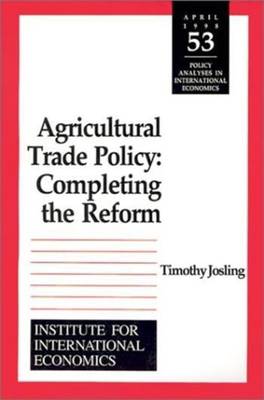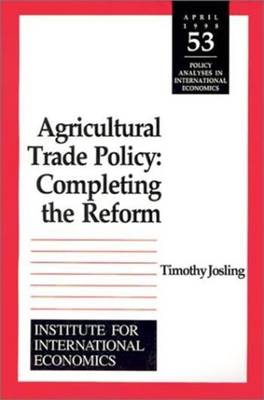
Je cadeautjes zeker op tijd in huis hebben voor de feestdagen? Kom langs in onze winkels en vind het perfecte geschenk!
- Afhalen na 1 uur in een winkel met voorraad
- Gratis thuislevering in België vanaf € 30
- Ruim aanbod met 7 miljoen producten
Je cadeautjes zeker op tijd in huis hebben voor de feestdagen? Kom langs in onze winkels en vind het perfecte geschenk!
- Afhalen na 1 uur in een winkel met voorraad
- Gratis thuislevering in België vanaf € 30
- Ruim aanbod met 7 miljoen producten
Zoeken
Omschrijving
Plans for broad supraregional trade structures, such as the Asia Pacific Economic Cooperation (APEC) forum and the Free Trade Area of the Americas (FTAA), have also dealt with the inclusion of agricultural trade. Meanwhile, in developing and middle-income countries, unilateral agricultural policy reforms have been part of recent economic policy changes. However, in the industrial countries, agricultural policy reform has languished in the face of much domestic opposition. But the reform of the European Unionâ s Common Agricultural Policy (CAP) in 1992 and the 1996 Farm Bill in the United States seems to have ushered in a new era of relations between government and agricultural groups. The author of this study points out ways that multilateral, regional, and unilateral paths could be coordinated to liberalized agricultural trade. He proposes a set of multilateral talks that would benefit from agricultural reform at all levels and complete the job begun at the Uruguay Round.
Specificaties
Betrokkenen
- Auteur(s):
- Uitgeverij:
Inhoud
- Aantal bladzijden:
- 132
- Taal:
- Engels
- Reeks:
- Reeksnummer:
- nr. 53
Eigenschappen
- Productcode (EAN):
- 9780881322569
- Verschijningsdatum:
- 1/04/1998
- Uitvoering:
- Paperback
- Formaat:
- Trade paperback (VS)
- Afmetingen:
- 155 mm x 232 mm
- Gewicht:
- 226 g

Alleen bij Standaard Boekhandel
+ 67 punten op je klantenkaart van Standaard Boekhandel
Beoordelingen
We publiceren alleen reviews die voldoen aan de voorwaarden voor reviews. Bekijk onze voorwaarden voor reviews.









